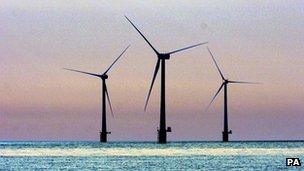Offshore wind power subsidy plans outlined by Scottish government
- Published

The proposed subsidy regime would reflect challenges and risks involved
The Scottish government has announced plans which could lead to the introduction of higher subsidies for offshore wind farms.
Energy Minister Fergus Ewing said wind turbines installed in deep water may receive increased financial support.
The move would be in recognition of the technical challenges and financial risks involved in developing offshore wind farms in Scottish waters.
Campaigners said it highlighted uncertainty over offshore wind power.
Mr Ewing has also announced the withdrawal of subsidies for new large-scale biomass power stations, which burn wood to generate electricity, but fail to capture and use the heat produced.
'Competitive advantage'
Financial support for hydro generation in Scotland is to remain unchanged, despite plans to cut the level of subsidy in the rest of the UK.
The Scottish government announced in July that subsidies for onshore wind farms would be reduced by 10%. The move is said to be due to the industry's success in reducing the cost of onshore wind generation.
Mr Ewing said: "The results of the Renewable Obligation review I am announcing today are vital to continued investment in renewables generation across Scotland, and will enhance still further our competitive advantage in this area.
"Over the last decade the Renewables Obligation has helped to almost triple renewable output in Scotland, and attract around £2.8bn of investment since 2009, according to industry figures."
Linda Holt, spokeswoman for Communities Against Turbines Scotland, said: "Today's news shows the Scottish government is deeply worried about the prospects for offshore wind in particular.
"Its ability to reassure renewable energy companies about the financial risks is severely limited because, ultimately, it will be consumers across the UK who will have to pick up the bill."
But environmental campaigners have welcomed the announcement.
Dr Richard Dixon, director of WWF Scotland, said: "This is a good set of decisions which give industry certainty, maintains strong support for marine renewables and makes sure that good hydro schemes can still be developed."
- Published31 August 2012
- Published10 August 2012
- Published28 June 2012
- Published23 April 2012
- Published24 March 2012